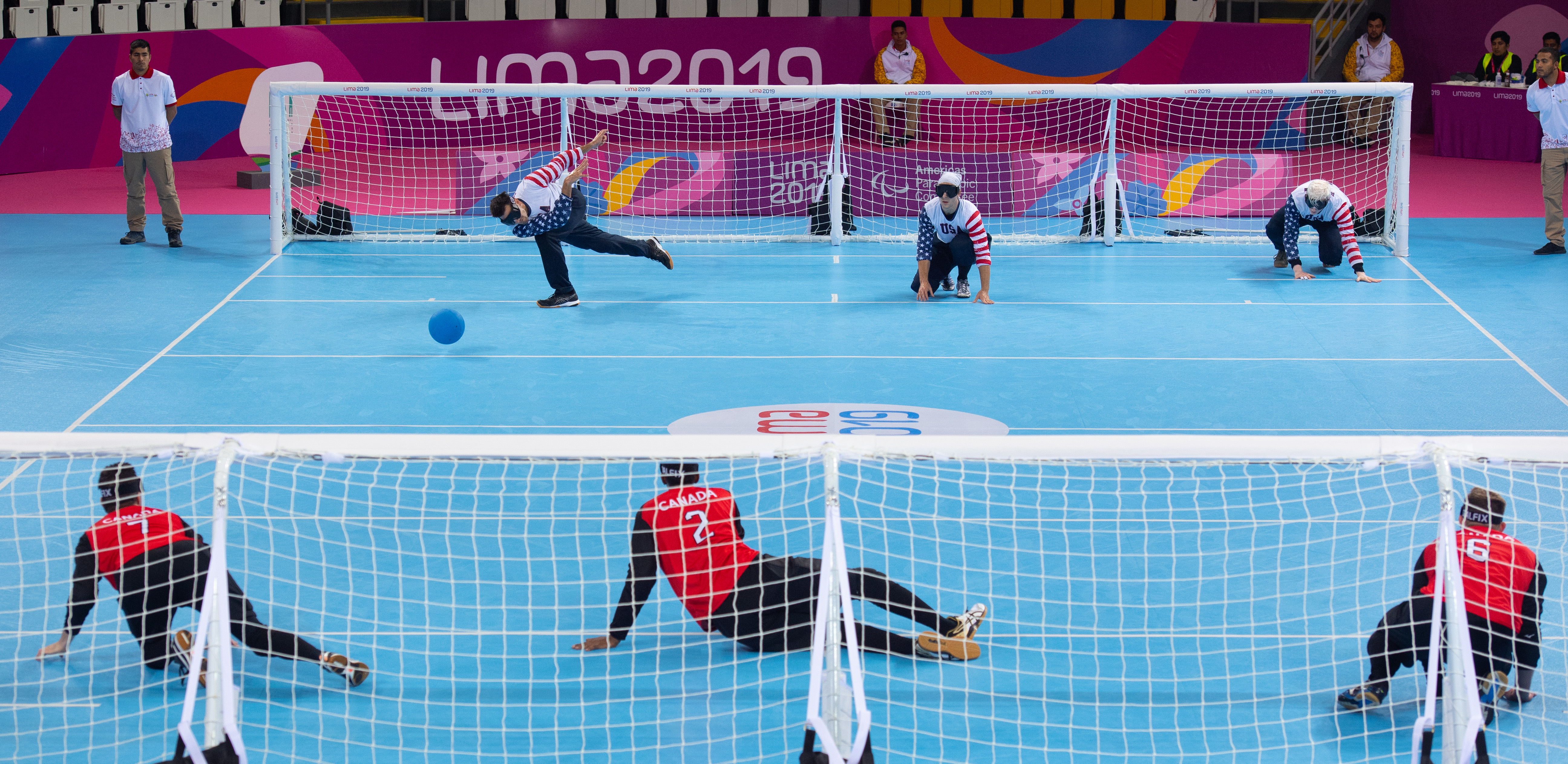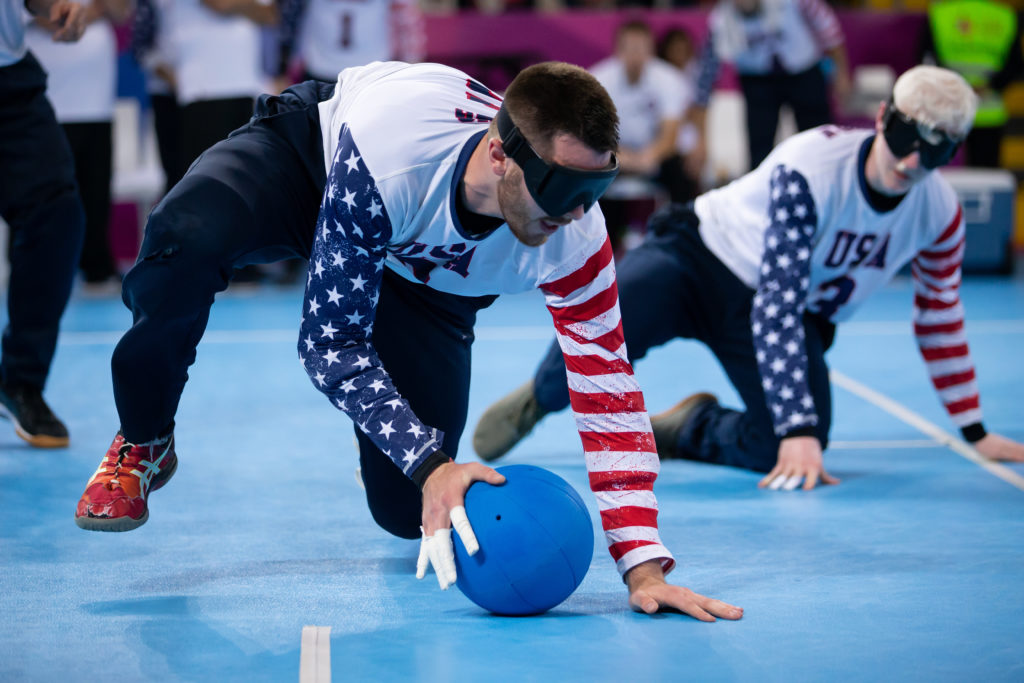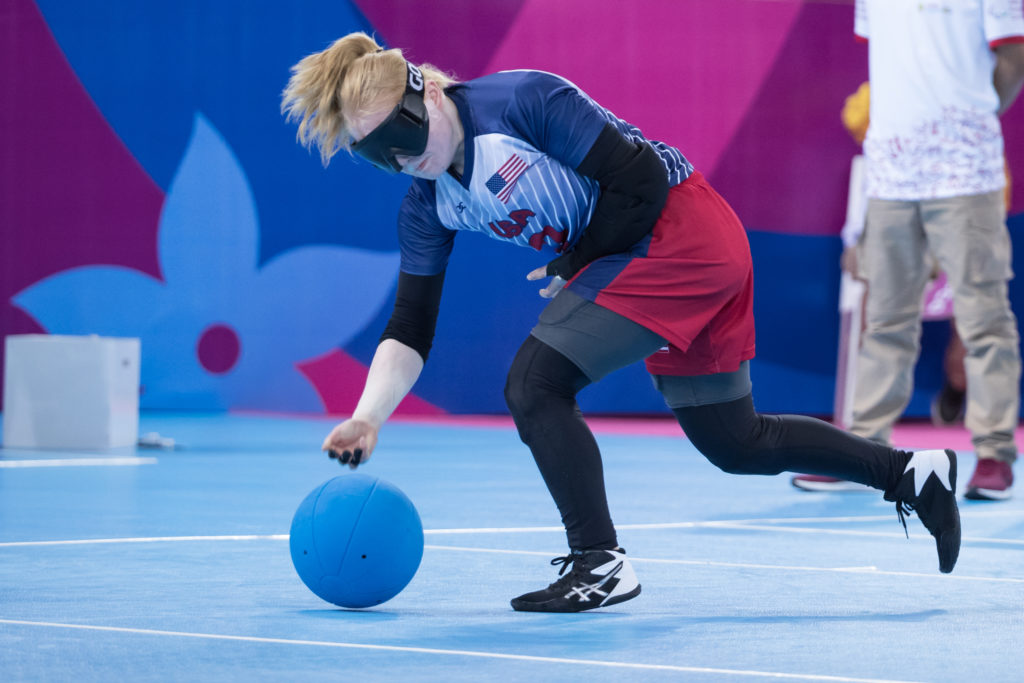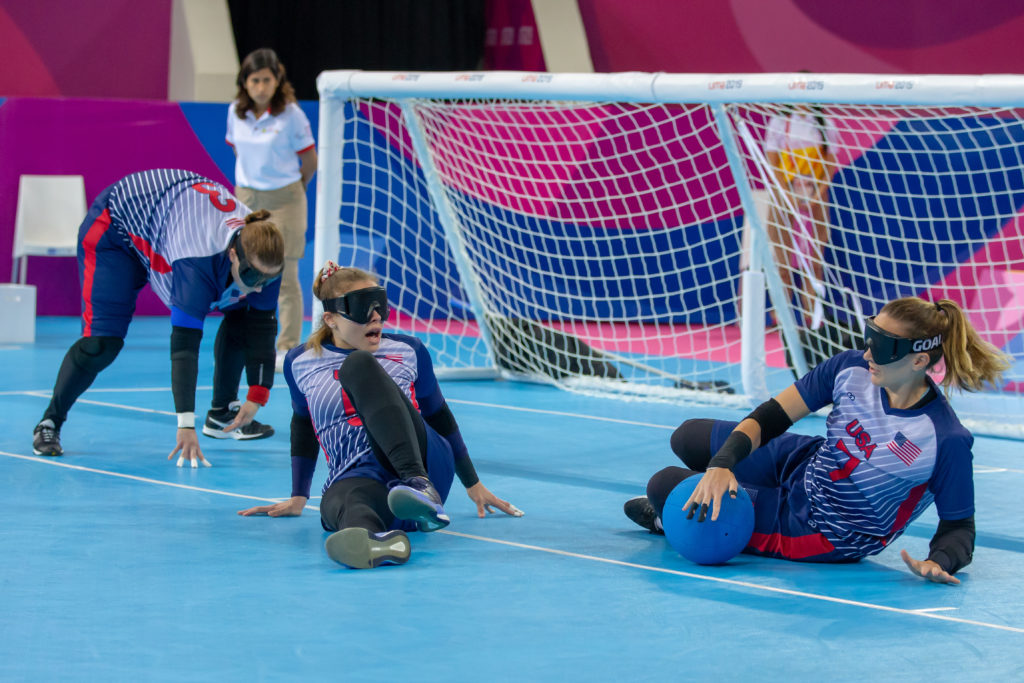When The Goal Moves, How Do Goalball Athletes Adjust?

by Bill Kellick
The date August 25, 2020, was circled on all the calendars of Paralympic hopefuls across the U.S. and around the world. As the day on which the Paralympic torch would be lit during the opening ceremony for the Paralympic Games Tokyo 2020, it represented a goal.
For athletes in the sport of goalball – a Paralympic sport played by athletes with visual impairments using a ball with bells inside — the goal signifies everything. During a game, they cannot see the goal, but they know it’s there…right across from them at the other end of the court.
Sure, obstacles are standing between them and the goal, mainly three opponents doing everything in their power to prevent the ball from entering the net. To score, players must call on their other senses…listening to where the opponent may be positioned and feeling the tactile lines on the court to orient themselves in relation to the goal.
But what happens when the goal is moved?
Most likely, the initial feeling would be one of exasperation and confusion, followed soon thereafter by a resilient need to refocus in order to achieve the desired outcome.
Such was the case on March 24 when the 2020 Olympic and Paralympic Games in Tokyo were postponed due to the COVID-19 pandemic enveloping the world. The announcement, although not totally unforeseen, still dealt a blow to the psyche of U.S. men’s and women’s goalball players due to the finality of it all.
“All of us have been preparing for the past several years with a very specific timeline in mind, and it felt shocking to have that disrupted,” said Marybai Huking, a member of the bronze-medal winning U.S. women’s goalball team at the Rio 2016 Paralympic Games.
Huking’s Rio teammate, Eliana Mason, felt that no matter how much she prepared herself for the decision, there is still a big difference between thinking something and knowing it to be a sure fact.
“When the announcement was official, l felt very off-balance,” Mason said. “I had been planning everything in my life around these specific dates for the past four years, including where I live, how I approach grad school, training, even down to the food I am eating. Having this core event up in the air made me feel a sense of a loss of direction and purpose.”
As hard as it was for Paralympic veterans like Huking and Mason to hear the news, it was just as tough on athletes striving to make their first Paralympic Games appearance, such as U.S. men’s goalball athlete Calahan Young.

Calahan Young is shooting for his first Paralympic Games appearance in Tokyo next year. (photo by Shannon Galea/Wheelchair Sports USA)
“This is my first Paralympic quad, and I have been working for this summer for four years, so the prospect of having another year before competing was hard to grasp,” he said.
In late March, with the unprecedented and unpredictable spread of the COVID-19 pandemic reaching more than 375,000 cases worldwide and growing by the hour in nearly every country, the International Paralympic Committee, along with the International Olympic Committee, came to the conclusion to reschedule the Games of the XXXII Olympiad in Tokyo to the following year.
“Though I know this was a difficult decision for the IPC and IOC to make, and a difficult decision for the athletes to hear, I do believe it was in everyone’s best interest,” acknowledged Huking. “Especially with how much things have escalated and the impact this has had globally, health and safety had to be prioritized.”
For an athlete, shifting gears both mentally and physically when the goal is moved can be a very difficult adjustment to make. The target date you had been focusing on and preparing for is now pushed a year further down the road. Understandably, the athletes went through an initial period of soul-searching and recalibration before being able to push onward.
“We were less than 200 days away from Tokyo. We are now over 500 days away,” said Mason. “The hardest part is feeling like you were so close to the goal you have been working toward and now having to step back.”
With busy calendars suddenly wiped clean and training facilities shuttered, motivation became the foremost challenge faced by the U.S. resident goalball teams in Fort Wayne, Indiana.
“We chose to participate in a team sport, in part, because we love the comradery of training and competing together,” said Jake Czechowski, head coach of the women’s team and resident coach for the men’s squad. “Not being able to spend that time together during our season is very difficult.”
“It is difficult to maintain the same momentum we had before the Games were postponed,” Huking noted. “With no tournaments in the coming months and an entirely thrown off timeline leading up to the Games, it is hard to keep our intensity in a time of such uncertainty.”
On top of their sporting calendars being readjusted, the goalball athletes also had to rearrange a few post-Tokyo plans they had on the docket in their personal lives for late 2020.
“I was supposed to start an internship for grad school after Tokyo, this will have to be reworked,” noted Mason. “I was also going to move home to Oregon after Tokyo, so I will be spending another year in Fort Wayne.”
The teams’ official U.S. Paralympic Training Site at the Turnstone Center is just a short walk across the street from their resident homes. However, when the facility was shut down on March 17 in an effort to halt the coronavirus spread — a full week before the postponement announcement — the players were suddenly left to perform workouts in their own homes.
“The toughest part for me is the motivation in the short term to work out while the facilities are closed,” Young said. “Not having access to weightlifting equipment and a court to practice is difficult, as that is what I had been doing since I moved to Fort Wayne.”
The teams’ strength and conditioning coach, EJ Whitney, created a bodyweight training plan for the athletes, and coaches reached out to non-resident athletes to make sure they had all the training equipment needed. Back in Fort Wayne, the basements of the resident homes were quickly converted into workout areas.
“We haven’t been able to practice any goalball, or have access to weights,” Mason said. “Our training right now consists of three at-home workouts a week our strength coach put together for us. They are all high-interval training and consist of a lot of bodyweight movements such as push-ups, lunges, squats, etc. Our training has drastically changed, and we are all working hard to maintain the conditioning we had been working so hard toward.”
Like most Americans who were suddenly thrust into the confines of their own homes for an extended period, the goalball athletes were forced to come up with creative ways to stay active and fit.

Marybai Huking won a bronze medal at the 2016 Rio Paralympic Games. (photo by Michael Clubine/Wheelchair Sports USA)
“We use things like soup cans to add weight and chairs for certain movements,” said Huking. “It is very hard to replicate defensive skills without having our court to play on, but we are able to practice throwing and work on some aspects of the game.”
“We are using bands to work on resistance training,” added Mason. “We are really focusing on eating healthy, which is something in our control. Also staying hydrated is really important. It can be easy to forget to drink water when you are home so much.”
To replicate the intensity of a goalball game, athletes are also doing 24-minute Tabata workouts consisting of quick, high-intensity movements punctuated by brief respites. They also practice diving and holding their position to strengthen muscle memory in their form, as well as holding a goalball and walking around the house trying to stay as quiet as possible.
“Goalball is a pretty easy sport to practice movements at home,” Young noted. “Practicing diving and throwing without a ball are two things that I do while watching TV or to take a break from schoolwork.”
But what about the time when they’re not working out? How do our resident goalball athletes stay sane?
“I am doing lots of reading, writing, learning to play guitar, training, baking, watching movies, and keeping up with friends and family,” said Huking.
“During the quarantine, I have been watching Netflix, doing schoolwork, eating, and working out,” added Young. “I have not got too bored yet, as school keeps me busy and mentally invested in new and interesting topics. Plus, Netflix has been distracting me the rest of the time.”
Schoolwork also keeps Mason busy in her downtime.
“I am a full-time graduate student at Antioch University, working toward a master’s in clinical mental health counseling,” she said. “I am still taking online classes and those are keeping me very busy during this time. I have been going on walks every day. There is a beautiful river trail where I live that I have been taking. Lastly, I have been reading a lot of good books and trying out new healthy food recipes during this time.”

Eliana Mason (right) makes a stop during the 2019 Parapan American Games in Lima, Peru. (photo by Shannon Galea/Wheelchair Sports USA)
With the new opening ceremony date for the Tokyo 2020 Paralympic Games slated for August 24, 2021, U.S. goalball athletes have shifted their focus a bit farther down the road. If you follow Young on his Instagram account (@TheRealCalahan) you will notice a daily post involving ever-shrinking numbers.
“I have been doing and will continue to do, a daily countdown until the Tokyo 2020 Paralympic Games in 2021,” Young said. “It builds my motivation that even though the Games are pushed back an entire year, we are still moving closer to the chance to win gold at the Paralympic Games. I also thought it would be a good way to get people re-invested and hyped about the Games occurring. I started doing the daily countdown because it motivates me not to hate any of these extra days that we got from a pandemic and try to use it as a positive adventure more than a negative situation. I plan on doing this every day until we get to opening ceremonies in August of 2021.”
Related Posts
New Jersey Honeybees and Seattle King Cobras Triumph at 2024 USABA Goalball National ChampionshipsForce, Monarchs and Renegades win gold at Southeast Qualifier
A Look Back on the Road to Paris…2016 Rio Paralympic Games
A Look Back on the Road to Paris…2004 Athens Paralympic Games
A Look Back on the Road to Paris…1988 Seoul Paralympic Games
